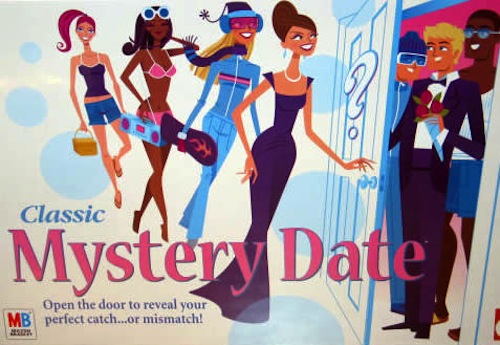First of all, the premise of the Mystery Date board game is awesome. Someone knocks on your door; you don’t know who it is, and you go on a date with them. How did they know where you live? It doesn’t matter—you’re just relieved that you did not draw the nerd card. As any semi-adolescent girl will tell you, drawing the nerd card is a catastrophic event. It is positively newsworthy, in fact. Proof: this Gawker piece series of screenshots about passive-aggressive text messages from a lawyer who showed up to the first date wearing a fedora. The fedora is key.* It establishes that the man whose text messages have now been viewed 77,000 times is an unsympathetic character, and we do not need to consider the implications of using the most sophisticated communications medium in human history to be catty about a bad date. It’s the same rhetorical device we see in this first date story and this one.
It establishes that the man whose text messages have now been viewed 77,000 times is an unsympathetic character, and we do not need to consider the implications of using the most sophisticated communications medium in human history to be catty about a bad date. It’s the same rhetorical device we see in this first date story and this one.
One of those stories is by Max Read, which I’m pretty sure is the pseudonym that Gawker uses when no one there wants his name attached to a piece of, um, news. Gawker runs these items next to stories about, for example, Rebekah Brooks being charged in the News of the World phone hacking scandal, which raises a lot of complex questions about internet journalism that we’re not going to address here. Suffice to say that Gawker cares about page views the way the bus in Speed cares about speed. We are rhetoric people, so I’m less interested in why Gawker has no gag reflex than in how they numb ours.
Step one is to establish that it is okay to make fun of whoever’s text messages are now national news. Mr. Read starts his story reprint of someone’s emails with the sentence, “Yesterday, we noted that financial professionals make horrible boyfriends.”*![]() For the purposes of the Bad Date Story, lawyers and finance guys are the same people: douches. The word “douche” appears in almost all stories of this genre, probably to remind us that we are talking about a kind of person and not just, you know, a person. Interestingly, the occupation of the douche/doucheness of the occupation is invariably one of the few things the other party knows before going on the date, which raises some more troubling questions that we are also not going to consider. For whatever reason, these two lucrative professions constitute a reason to go out with someone before you know him and proof of his douchery after you do.
For the purposes of the Bad Date Story, lawyers and finance guys are the same people: douches. The word “douche” appears in almost all stories of this genre, probably to remind us that we are talking about a kind of person and not just, you know, a person. Interestingly, the occupation of the douche/doucheness of the occupation is invariably one of the few things the other party knows before going on the date, which raises some more troubling questions that we are also not going to consider. For whatever reason, these two lucrative professions constitute a reason to go out with someone before you know him and proof of his douchery after you do.
Make no mistake: our lawyer in the fedora is a douche. He violates a cardinal rule of dating, which is that when someone says they do not want to see you again, don’t argue. “No problem at all,” he says, before questioning all of her reasons, “but no problem.” Then he sends her an extraordinarily long text describing her mediocrity to his “bro,” followed by an apology text saying that he meant to send it to somebody else.
So he’s a clever devil. He also seems to be a walking collection of classic dating mistakes: the fedora, the movie—I remain firm in my insistence that the best way to get to know someone is not to face the same direction in a darkened room where talking is prohibited—the inability to take no for an answer, the transparent manipulation. These elements are compelling because they are familiar. Almost all of us have had people try to talk us into another date, and most of us have, shamefully, tried to do the talking-into ourselves. The comments section for this story is alive with speculation that the man in the fedora is a pickup artist who is trying to “neg” her. That is like declaring someone a roofer because he fell from a great height, but efficacy is not the point; the point is that this man is a recognizable type.
Again, that anesthetizes us to the otherwise unpleasant task of treating his personal correspondence as news. But it also makes the story seem au courant, like a snapshot of how we live now rather than a screenshot of some lady’s iMessages. In this regard, the Bad First Date Story has more in common with fiction than with journalism. It starts with recognizable types in a familiar situation and uses telling details to bring them to life. That the details are from actual people’s actual actions is the only similarity between these pieces and news. It’s probably also why we shouldn’t read them—or, better yet, spend a lot of time thinking about why we feel bad and do it anyway.





Also, my list failed to include “Not-In-Diana Jones.”
“For whatever reason, these two lucrative professions constitute a reason to go out with someone before you know him and proof of his douchery after you do.”
Dan ain’t sayin’ she’s a gold digger…